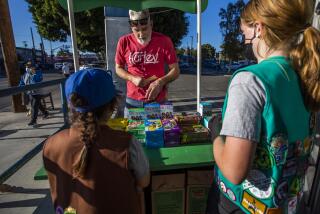Scoutmaster Continues Tradition That Made Him ‘Always 1st Class’
When Pat Freedman registered her oldest son, Mike, in Cub Scouts 40 years ago, little did she imagine that it was her husband, Buck, who would turn into the family’s super Scout.
“She thought it would keep me out of mischief to have a night out with the boys, except the boys were all 15 years old,” recalled Irwin (Buck) Freedman. (The nickname comes with no campfire story attached, he insisted. “If you had a name like Irwin you’d want to be called something else, too.”)
Freedman, who soon will turn 70, was never a Boy Scout himself. But by the time his two sons were too old for Scouting, he had taught himself everything in the handbook by, in his words, staying one page ahead of the kids.
Over four decades, including the last 18 years as Scoutmaster with Troop 117 of Brentwood, Freedman said he has seen a lot of changes in the lives and behavior of boys. In many ways, he said, today’s 11-year-olds are as aware and as smart as the 14-year-olds he led years ago. Yes, kids do grow up faster now.
One thing that hasn’t changed, though, is the need for adults and adolescents to be close, he said. Scouting provides the opportunity, and boys in the 1990s need it more than ever, he said.
“Behaviorally, they lack courtesy, respect and deference to elders” compared with the Scouts of several decades ago, Freedman said. “They lack the free time to go out and be creative and throw some rocks. The expression ‘Boys will be boys’ has a totally different interpretation today--more to do with sexual harassment--than it did years ago, and I don’t buy it, not one bit.
“I say the same things today that I said in the ‘50s,” he said. “I leave the ‘physically strong’ part of the Scout laws to the coaches, and the ‘mentally alert’ part I leave to the teachers. It’s the ‘morally straight’ part that I emphasize. I’m not a saint, and I admit that to the boys, but I don’t accept peer pressure as an excuse for negative behavior, because that same pressure can be switched to the opposite direction.”
Troop 117, sponsored by the Brentwood Presbyterian Church, is known as Buck’s Boys. Freedman still goes to camp.
He has a difficult time articulating what it is that he offers Scouting. He says he is a surrogate grandfather. But then he offers his visitor a book and suggests that it’s better to read what the Scouts say they get than for him to say what he offers.
The album is a souvenir from a surprise dinner given in his honor in May by the boys and families of Troop 117. The dinner plans were in progress when Freedman was suddenly hospitalized for heart bypass surgery. The album is filled with testimonials from Buck’s Boys, past and present. He also received a plaque with the engraving: “Never a scout, but always 1st Class.”
*
Gary Davis, 45, will always see himself as one of Buck’s Boys. Davis, one of the founders of Angel Flight, a free airplane service for needy medical patients, credits Freedman with giving him a “strong foundation for the things which have added value to my life and the lives of those I have touched.”
Freedman recalled the time Davis fell through the ice on a Scout outing. “Fortunately, they listened to me in those days about bringing a buddy along when you separated from the group, and that’s how he was saved. But, of course, he disobeyed me by going on the wrong side of the lake,” Freedman said.
The album also contained letters from current Scouts such as Perrin Disner, 13, who wrote that “you were always there to pull a dozen cactus needles out of our hands and heinys (sic). You have provided everyone with a good, responsible, level-headed leader.” Andrew Wilder, 17, wrote that Freedman was there to guide him--and “not just by following a trail map.”
Freedman says he believes it’s still possible for Scouting to teach boys to help others, and to keep themselves “physically strong, mentally awake and morally straight.” He hasn’t changed his style or his perspective, and he still follows the same rule with his boys.
One of the most important things about being a Scoutmaster, he said, is knowing “when to give freedom and when to pull back without confusing them too much.”
Freedman is going to camp with his boys again in a few weeks. His grandson Daniel is coming with him. And another generation of Buck’s Boys will sit around a campfire.


